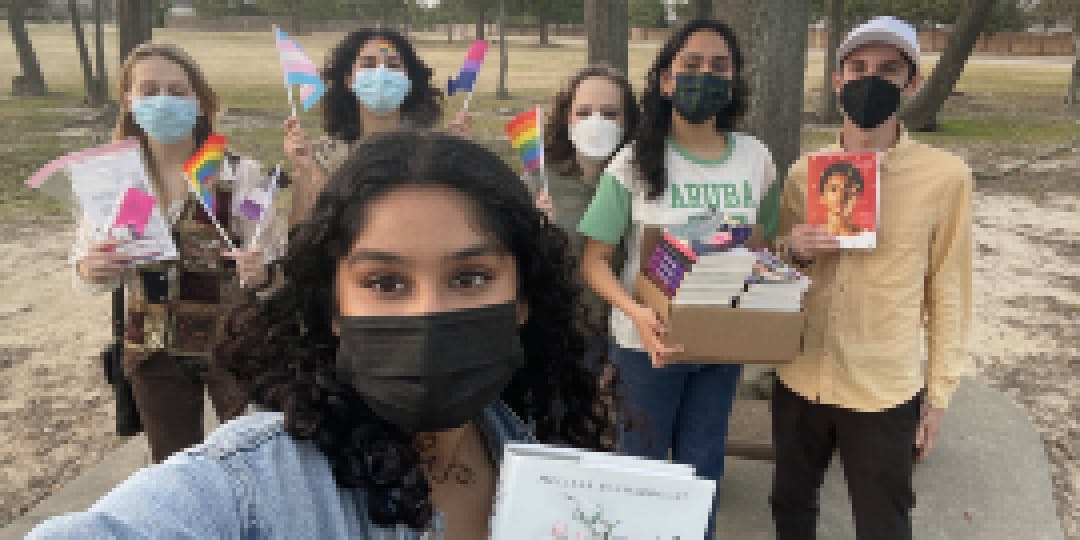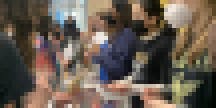Students Are Jumping Into The Fray Over Book Bans

When highschool senior Cameron Samuels began attending faculty board conferences within the Houston suburb of Katy final yr, they have been sometimes one in all just a few voices—and at instances the one voice—talking in assist of scholar entry to LGBTQ supplies.
Samuels, 18, who makes use of they/them pronouns, began by beseeching their district to unblock web sites just like the Trevor Project, a suicide prevention group for queer youth, and to refrian from banning library books that featured LGBTQ+ characters or handled racism. Around the identical time, a Texas lawmaker demanded that colleges report their purchases of books that would “make students feel discomfort,” and Samuels says adults confirmed up in bigger numbers than to not assist ebook removals.
“As a member of the LGBTQ community, I feel attacked because that’s something that I am,” Samuels says. “It’s been hard to hear speakers target the LGBTQ community and say we are promoting what they call pornography in these books.”
That modified on Monday, when Samuels says college students spoke out in opposition to ebook censorship at a Katy ISD board assembly that was overflowing with supporters. The robust displaying got here on the heels of what they dubbed “FReadom Week,” throughout which Samuels and different scholar members of the nonpartisan group Voters of Tomorrow distributed practically 200 books that includes LGBTQ+ and BIPOC—Black, Indigenous and other people of coloration—themes at 4 district excessive colleges.
“We packed the room full,” Samuels says of the board assembly. “There was so much representation from students and supporters of the LGBTQ community, and it was great to see how our FReadom Week had been a success.”

Samuels and their friends are a part of a rising motion of scholars who’re pushing again in opposition to ebook bans throughout the nation. As challenges in opposition to books about race, gender and sexuality proceed to realize traction, New York highschool scholar Jack Lobel says college students need to study from literature with views from the LGBTQ+ neighborhood and writers of coloration.
“For book banning in particular, a lot of the coverage has been around lawmakers, authors, parents and school boards, but young people are the one missing out on these important conversations,” says Lobel, 17, who serves as communications director for Voters of Tomorrow. He provides that ebook distributions are happening in Texas and Virginia. “Young people are the leaders of tomorrow, and we deserve to have these books be part of our curricula.”
It’s not simply Lobel’s group making waves. In the previous month, Pennsylvania college students have garnered nationwide recognition for efficiently fighting back in opposition to their faculty district’s ban on anti-racist books. A gaggle of Texas middle schoolers began the Round Rock Black Students Book Club to dig into literature that represents them. And Missouri college students are suing their faculty district over a banned ebook record that features Toni Morrison’s “The Bluest Eye.”

“People will say that [more-inclusive curriculums] will make White people feel uncomfortable,” 17-year-old Christina Ellis, one of many scholar advocates in opposition to Central York School District’s ebook ban, tells the Washington Post. “Well, it’s also uncomfortable for African American students to hear in classes that their ancestors were being lynched and have all the White kids turn around, look at you and stare at you while the teacher is talking to you about that.”
As for Samuels, they and different Katy ISD college students aren’t achieved but. They’re planning one other ebook distribution this week—with titles together with Toni Morrison’s “Beloved” and Art Spiegelman’s “Maus”—and a rally in opposition to ebook censorship on the Texas Capitol in March.
Samuels says one other disturbing side of the continued controversy is that oldsters obtain a district notification when their youngster checks out a younger grownup novel from the library, seemingly focused at books that function LGBTQ+ characters and points.
“[Some students] were like, ‘Never mind, I’m not going to check that book out,” Samuels says of his friends who realized of the notifications. “Those that don’t know about it are forcibly outed to their parents without them knowing, and that is a big issue. Students need to have access to this affirming content.”






